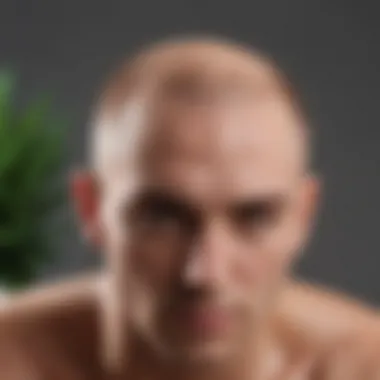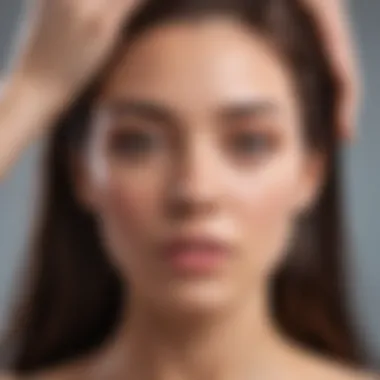The Definitive Guide to Effective Pink Scalp Remedies


Well-Being Overview
As we embark on the journey towards understanding and addressing a pink scalp, it's crucial to take a holistic approach that encompasses not just physical health, but also mental well-being. The scalp, being a reflection of our overall health, requires a thorough understanding of various aspects that contribute to its condition. From environmental factors to internal imbalances, every element can play a significant role in the well-being of our scalp.
Mental Health Matters
In the realm of scalp care, mental health plays a pivotal role that is often overlooked. Understanding the relationship between our emotional well-being and the health of our scalp is essential in developing effective remedies. Stress and anxiety, prevalent in today's fast-paced world, can directly impact scalp health, leading to conditions such as sensitivity and inflammation. By implementing strategies to enhance mental well-being and coping mechanisms for stress, we can create a conducive environment for scalp healing and overall health.
Physical Wellness
Incorporating physical wellness into our routine is paramount for scalp health. Regular exercise not only boosts blood circulation, promoting scalp health, but also aids in stress reduction, a common trigger for scalp issues. Complementing physical activity with healthy eating habits further nourishes the scalp from within, providing essential nutrients for its well-being. The importance of a balanced lifestyle that includes exercise and a nutritious diet cannot be understated in the quest for a pink scalp.
Mindfulness & Self-Care Practices
Amidst the hustle and bustle of daily life, carving out time for mindfulness and self-care practices is instrumental in scalp care. Mindfulness techniques not only help in managing stress, but also promote relaxation, creating an environment conducive to scalp rejuvenation. Self-care rituals, whether in the form of scalp massages or dedicated relaxation moments, offer a much-needed break from the chaos of daily life, allowing the scalp to recover and thrive.
Nutrition for Nourishment
Nourishing our bodies with a balanced diet lays the foundation for a healthy scalp. Including nutrient-rich foods in our meals provides the essential vitamins and minerals crucial for scalp health. From leafy greens packed with antioxidants to omega-3-rich salmon, the choices we make in the kitchen directly impact the well-being of our scalp. Experimenting with easy and healthy recipes not only enhances our culinary repertoire but also fuels the scalp with the nourishment it craves for optimal health.
Understanding Pink Scalp: Causes and Symptoms
Understanding the causes and symptoms of a pink scalp is crucial in addressing potential issues effectively. By delving into the reasons behind the pink hue on the scalp and recognizing the associated symptoms, individuals can take appropriate steps to alleviate discomfort and maintain scalp health. This section serves as a foundation for the subsequent discussions on natural remedies and skincare tips, offering valuable insights into the root causes of scalp redness, itching, and flaking.
Common Causes of a Pink Scalp
Sunburn
Sunburn plays a significant role in causing a pink scalp due to prolonged exposure to harmful UV rays. The key characteristic of sunburn-induced scalp redness is its immediacy post-exposure, often accompanied by tenderness and warmth in the affected area. While sunburn is a common issue, its effects on the scalp can be particularly uncomfortable, making it a pertinent topic in this article. Despite its prevalence, sunburn requires special attention in the context of scalp care, given the unique challenges it poses in treatment and prevention.
Chemical Irritation


Chemical irritation can result in a pink scalp, especially when using hair products containing harsh chemicals. The main characteristic of chemical-induced scalp redness is its localized nature, often manifesting as a reaction to specific ingredients. Discussing chemical irritation in this article is essential for highlighting the potential risks associated with certain haircare products and the importance of choosing scalp-friendly options. Understanding the nuances of chemical irritation can guide readers in making informed decisions regarding their hair care routine.
Skin Conditions
Various skin conditions, such as eczema or psoriasis, can contribute to scalp redness and discomfort. The fundamental feature of skin condition-related scalp redness is its chronic nature, requiring consistent management strategies. Addressing skin conditions in this article underscores the complexities of scalp health and the need for tailored approaches to mitigate symptoms effectively. By recognizing the impact of skin conditions on scalp appearance and texture, individuals can better navigate their scalp care routine.
Symptoms to Look Out For
Redness
Redness on the scalp is a key symptom indicating underlying issues such as inflammation or sensitivity. The prominent characteristic of redness is its visibility, often accompanied by warmth or tenderness. Including redness as a symptom to watch for in this article sheds light on its significance in assessing scalp health and identifying potential concerns. Recognizing the presence of redness can prompt individuals to take proactive steps in soothing and caring for their scalp.
Itching and Irritation
Itching and irritation are common symptoms associated with a pink scalp, signaling potential allergic reactions or underlying skin conditions. The main feature of itching and irritation is their disruptive nature, often leading to discomfort and distress. Discussing these symptoms in this article is crucial for emphasizing their impact on daily life and overall well-being, prompting readers to seek appropriate remedies and professional advice. Managing itching and irritation effectively is essential in maintaining scalp comfort and health.
Flaking
Flaking on the scalp can indicate various issues, such as dryness or dermatitis, contributing to the pink discoloration. The defining trait of flaking is its visibility through white or grayish scales on the scalp or hair. Exploring the symptom of flaking in this article offers insights into its causes and implications for scalp health. By addressing flaking as a significant concern, individuals can implement targeted strategies to alleviate dryness and restore scalp balance.
Natural Remedies for Soothing a Pink Scalp
In this expansive guide on remedies for a pink scalp, the section on natural remedies unveils vital insights for maintaining a healthy scalp. Natural remedies stand out as effective solutions that offer great benefits for soothing a pink scalp. These remedies provide holistic care while minimizing exposure to harsh chemicals that could potentially exacerbate scalp issues. By focusing on natural remedies, individuals can leverage the healing powers of nature to nurture their scalp back to health. The use of natural ingredients ensures gentle yet potent care for sensitive scalps, making this section a cornerstone in promoting scalp wellness.
Aloe Vera Gel
Aloe Vera gel is renowned for its exceptional anti-inflammatory properties, making it a key player in soothing a pink scalp. The anti-inflammatory benefits of Aloe Vera gel help to alleviate redness and irritation commonly associated with a pink scalp. It provides a cooling effect that not only calms the scalp but also promotes overall comfort. This natural remedy is a popular choice for its gentle yet effective nature, ensuring that the scalp receives the care it needs without harsh side effects.
Coconut Oil
Coconut oil impresses with its remarkable moisturizing benefits, making it a valuable ally in the quest to soothe a pink scalp. The moisturizing properties of coconut oil help to combat dryness and nourish the scalp, fostering an environment conducive to scalp health. Its antibacterial properties further contribute to scalp wellness by protecting against infections and promoting a balanced scalp flora. While coconut oil offers exceptional benefits for scalp hydration, its richness requires careful application to avoid excessive greasiness.


Tea Tree Oil
Tea tree oil boasts potent antimicrobial effects that play a pivotal role in combating scalp issues and soothing a pink scalp. Its antimicrobial properties help to address underlying causes of scalp irritation and promote a healthier scalp environment. Additionally, tea tree oil provides relief from itching, offering immediate comfort to individuals dealing with scalp discomfort. This natural remedy is a popular choice due to its dual action of addressing scalp concerns while providing much-needed relief, making it a versatile option for scalp care.
Skincare Tips for a Healthy Scalp
This section delves into the fundamental importance of skincare tips for maintaining a healthy scalp in the greater context of addressing a pink scalp. The scalp, akin to the rest of the skin, requires adequate care to mitigate issues like dryness, sensitivity, and inflammation, common culprits for a pink scalp. Implementing appropriate skincare measures not only enhances the overall health of the scalp but also fosters a suitable environment for optimal hair growth. Effective skincare routines contribute significantly to scalp health, aiding in maintaining equilibrium and vitality.
Gentle Shampoo Selection
Sulfate-Free Formulas
Sulfate-Free Formulas play a pivotal role in ensuring scalp health due to their gentle cleansing properties. Unlike traditional shampoos containing sulfates, sulfate-free formulations are milder on the scalp, thereby reducing the risk of irritation and dryness. The absence of sulfates helps maintain the natural oils on the scalp, promoting moisture retention and preventing over-stripping. Users appreciate sulfate-free shampoos for their ability to cleanse without causing scalp imbalances, making them an ideal choice for individuals seeking to enhance scalp health and combat pink scalp concerns.
Avoiding Harsh Ingredients
The practice of avoiding harsh ingredients in hair care products, including shampoos, significantly contributes to maintaining a healthy scalp. Harsh chemicals can disrupt the scalp's natural pH balance, leading to issues like dryness, sensitivity, and inflammation—common triggers for a pink scalp. By steering clear of harsh ingredients such as parabens, sulfates, and artificial fragrances, individuals can safeguard their scalp health and minimize the risk of adverse reactions. Opting for products with gentle, nourishing components can promote scalp well-being and mitigate potential discomfort, aligning with the principles of this article's focus on optimal scalp care.
Scalp Massage Techniques
Emphasizing scalp massage techniques elevates the discussion on scalp health by underscoring the beneficial impact of stimulating blood circulation. Improved blood circulation to the scalp enhances nutrient delivery and oxygenation to the hair follicles, fostering a conducive environment for hair growth. The practice of scalp massage not only aids in increasing circulation but also relaxes the scalp muscles, reducing tension and promoting overall well-being. Implementing scalp massage techniques offers a holistic approach to scalp care, addressing both physical and mental aspects while supporting the goal of maintaining a healthy scalp.
Improving Blood Circulation
Boosting blood circulation through scalp massage is a key aspect of promoting scalp health within this article's scope. Enhanced blood flow to the scalp assists in nourishing the hair follicles, promoting hair growth, and maintaining scalp vitality. By improving blood circulation, individuals can fortify their scalp's resilience against external stressors and internal imbalances, contributing to the prevention of conditions such as dryness and inflammation. The emphasis on enhancing blood circulation underscores the holistic approach advocated in this article, catering to individuals seeking comprehensive solutions for vibrant scalp health.
Promoting Hair Growth
A focal point of scalp massage is its efficacy in promoting hair growth, an essential consideration for individuals grappling with concerns related to a pink scalp. Through targeted massage techniques, individuals can support hair follicle stimulation, leading to potential improvements in hair density and thickness. Scalp massage aids in facilitating nutrient uptake and promoting hair follicle activity, crucial factors in nurturing healthy hair growth. By advocating for scalp massage as a means of promoting hair growth, this article offers practical insights into addressing scalp-related issues and fostering optimal hair health in alignment with individuals' scalp care objectives.
Protection from UV Exposure


Protecting the scalp from UV exposure emerges as a vital aspect of maintaining scalp health, particularly concerning individuals dealing with pink scalp issues. Shielding the scalp from harmful UV rays not only prevents potential sunburn but also safeguards against UV-induced skin damage, which can exacerbate conditions like sensitivity and inflammation. By adopting protective measures against UV exposure, individuals can preserve scalp health, reduce the risk of discomfort, and promote long-term well-being. This section enlightens readers on the significance of safeguarding the scalp from UV radiation, integrating protective practices into scalp care routines to fortify health and vitality.
Wearing Hats
Wearing hats is a proactive approach to shielding the scalp from UV radiation, aligning with the protective measures espoused in this article. Hats provide a physical barrier against direct sun exposure, reducing the scalp's susceptibility to sunburn and UV-related skin damage. The simple act of wearing a hat when outdoors can significantly diminish the adverse effects of UV radiation on the scalp, underlining its relevance in the context of promoting scalp health and mitigating pink scalp concerns.
Using SPF Hair Products
The utilization of SPF hair products adds an extra layer of protection against UV radiation, enhancing the overall defense mechanisms to preserve scalp health. Specifically formulated with sun protection factors, these products create a shield over the scalp, deflecting harmful UV rays and mitigating the risk of sun-induced skin issues. By incorporating SPF hair products into their routine, individuals can bolster their scalp's resilience to external aggressors, fostering a supportive environment for optimal scalp health. Highlighting the importance of using SPF hair products underscores the proactive strategies advocated in this article, emphasizing preventative measures to uphold scalp well-being and combat pink scalp challenges.
Consulting a Dermatologist for Persistent Concerns
In this ultimateguide to remedies for a pink scalp, the section on consulting a dermatologist for persistent concerns plays a crucial role. When dealing with ongoing issues related to scalp health, seeking professional help from a dermatologist becomes essential. Dermatologists are highly trained experts in skin and scalp conditions, equipped with the knowledge and tools to diagnose and treat various concerns effectively. They can offer personalized treatment plans tailored to individual needs, ensuring the best possible outcomes. By consulting a dermatologist for persistent concerns, individuals can address underlying issues causing pink scalp and receive targeted solutions for long-term relief and scalp health maintenance.
Signs to Seek Professional Help
Chronic Redness
Chronic redness of the scalp is a significant indicator of underlying issues that require professional evaluation and treatment. It is characterized by persistent redness that does not alleviate with home remedies or over-the-counter treatments. Chronic redness may indicate inflammation, sensitivity, or an underlying skin condition that needs expert intervention. Consulting a dermatologist for chronic redness allows for proper diagnosis through in-depth evaluation and testing. Dermatologists can recommend specialized treatments to address the root cause of redness and promote scalp healing effectively.
Severe Flaking
Severe flaking, despite being a common concern, should not be overlooked when experiencing scalp issues. It presents as excessive shedding of skin flakes on the scalp, often accompanied by itching and discomfort. Severe flaking can be caused by various factors such as dryness, fungal infections, or skin conditions like seborrheic dermatitis. Seeking professional help for severe flaking is crucial to identify the underlying trigger and establish a targeted treatment plan. Dermatologists can prescribe medicated shampoos, topical ointments, or oral medications to manage flaking and restore scalp health.
Persistent Discomfort
Persistent discomfort on the scalp is a persistent issue that requires attention from a dermatologist for proper evaluation and management. This discomfort may manifest as itching, tenderness, or general sensitivity that impacts daily comfort and quality of life. Dermatologists can conduct thorough examinations to determine the cause of persistent discomfort, whether it stems from inflammation, allergies, or other underlying conditions. Treatment options prescribed by dermatological experts aim to alleviate discomfort, reduce inflammation, and restore scalp health effectively.
Treatment Options from Dermatological Experts
Prescription Medications
Prescription medications prescribed by dermatologists play a vital role in addressing complex scalp issues that require targeted intervention. These may include oral medications to manage inflammation, antibiotics to treat infections, or topical corticosteroids to reduce redness and itching. Prescription medications are effective in controlling severe scalp conditions like psoriasis, eczema, or folliculitis. Dermatologists tailor the prescription based on the specific diagnosis and individual needs, ensuring optimal results with minimal side effects.
Specialized Topical Solutions
Specialized topical solutions recommended by dermatological experts offer targeted relief for various scalp concerns, enhancing the effectiveness of treatment regimens. These solutions may include medicated shampoos, scalp serums, or corticosteroid creams designed to address specific issues like dandruff, seborrheic dermatitis, or scalp psoriasis. Specialized topical solutions work by targeting the root cause of the problem, while soothing irritation, reducing inflammation, and supporting scalp healing. Dermatologists guide patients on the application and frequency of these solutions to maximize their benefits and optimize scalp health.



